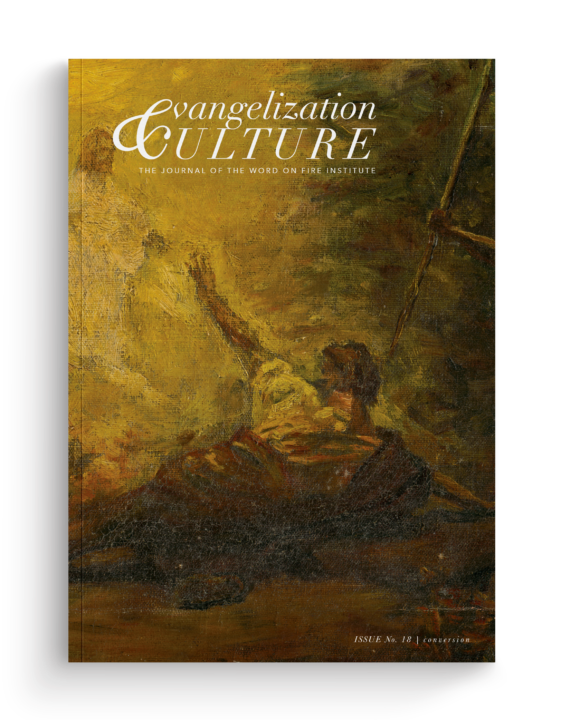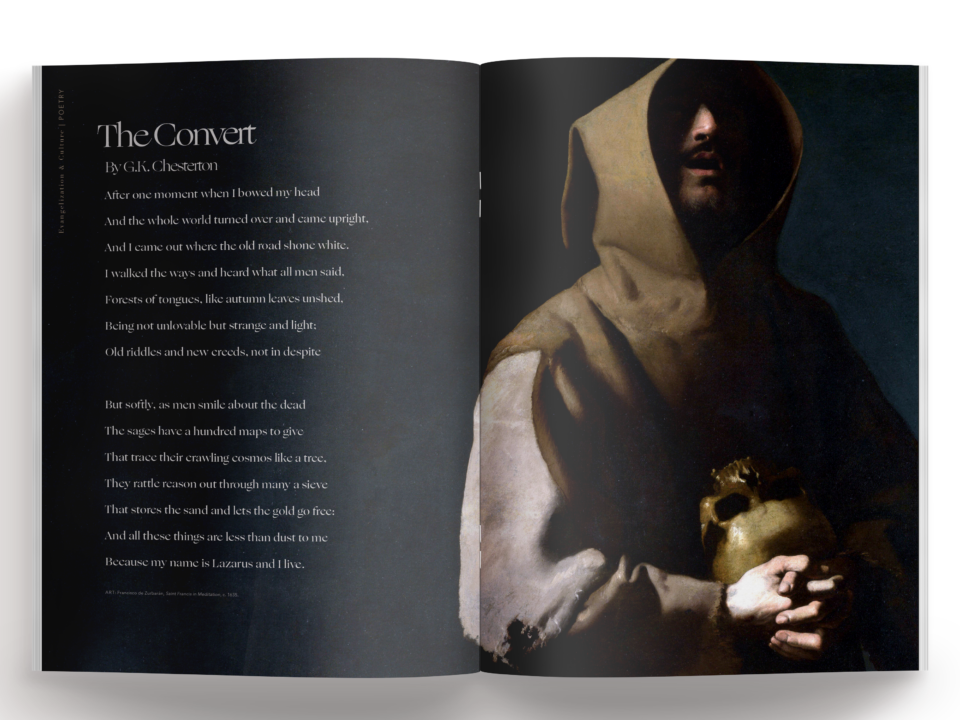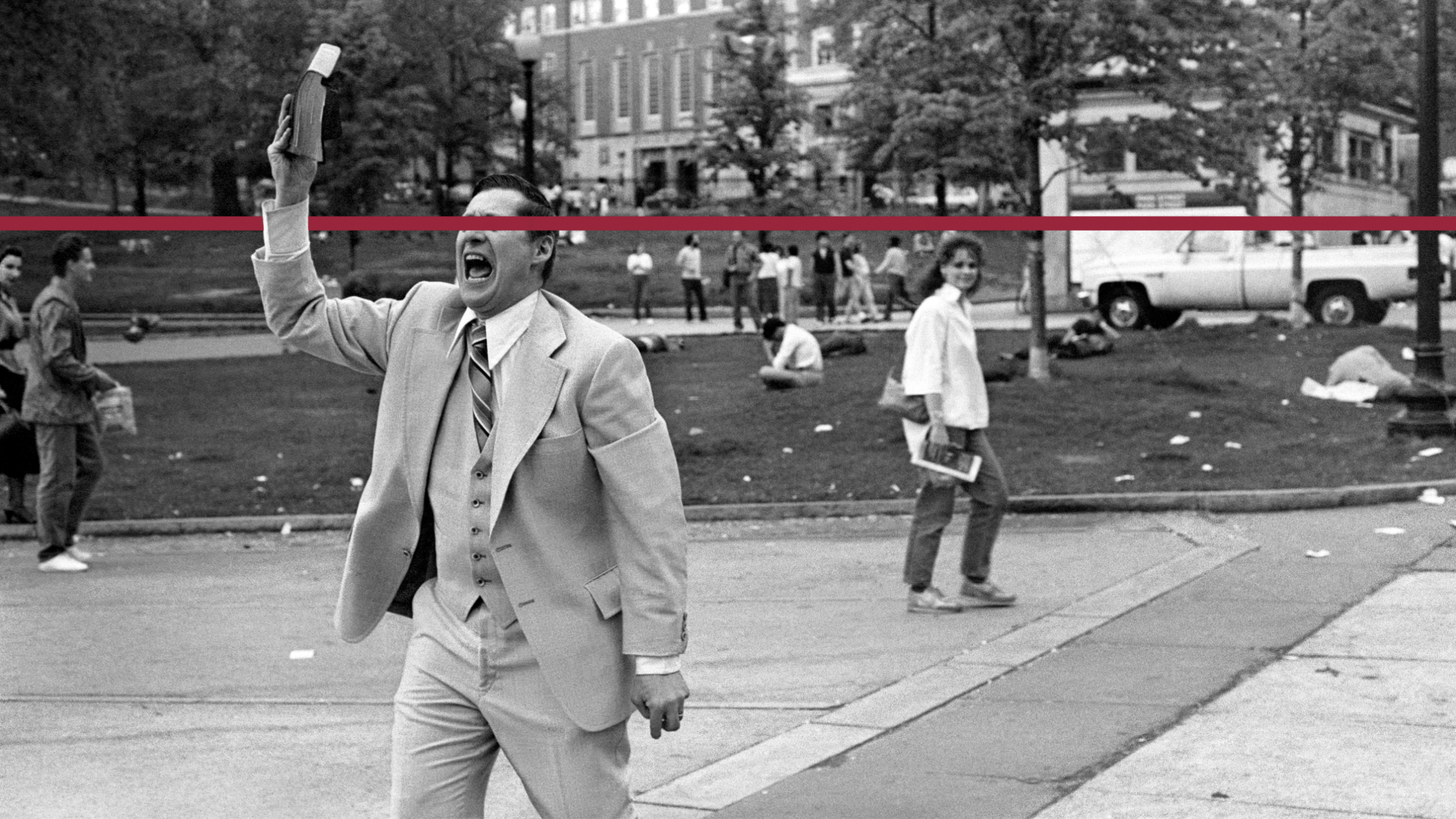Members of the Word on Fire Institute receive print and digital access to the award-winning quarterly journal, Evangelization & Culture. This piece is a highlight from Issue XVIII: “Conversion.”

Voices within the Church periodically warn the faithful to eschew “proselytizing.” It is a puzzling admonition. The Church’s primary evangelical fault during the past half-century, at least in the West, has taken the form of hypocrisy, timidity, and worldly accommodation, not assertiveness. Cautioning Catholics not to “proselytize” is thus akin to scolding a group of sleeping children to “pipe down” to avoid disturbing the houseguests.
That’s not to say that the Church has a spotless record in carrying out her missionary mandate. Yet she has always held that compelled conversion is a grave violation of individual dignity and conscience. One of the gifts of freedom, the Church maintains, is that it cannot be conquered from without; our bodies can be chained, and our perception can be manipulated, but only the individual can fully surrender the contents of her or his mind and heart. This final integrity of the conscience comes through in St. Paul’s declaration that “neither death, nor life, nor angels, nor rulers, nor things present, nor things to come, nor powers, nor height, nor depth, nor anything else in all creation, will be able to separate us from the love of God in Christ Jesus our Lord” (Rom. 8:38–39). It also forms the foundation of St. John’s Chrysostom’s classic treatise “No One Can Harm the Man Who Doesn’t Harm Himself.” Indeed, even St. Augustine, who controversially approved of using punishment to combat the violent Donatist heresy, believed that coercive measures against false religious beliefs presuppose the existence of an individual’s interior freedom—the freedom to repent and reform.1
Whatever lamentable aberrations we find in Church history, the Magisterium clearly affirms that the faith can and must grow only by invitation. As the Catechism explains,
To be human, man’s response to God by faith must be free, and . . . therefore nobody is to be forced to embrace the faith against his will. The act of faith is of its very nature a free act. God calls men to serve him in spirit and in truth. Consequently they are bound to him in conscience, but not coerced. . . . Christ invited people to faith and conversion, but never coerced them.
Freedom constitutes the condition for the possibility of faith; no freedom, no faith—and no faith, no salvation. There is, in short, nothing more fundamental to the missionary mandate than respecting individuals’ freedom to respond to the Church’s invitation to be in full relationship with Christ Jesus. If proselytization means the manipulation of freedom—and according to Bishop Barron, this is how Pope Francis understands the term—then “proselytizing” is, indeed, categorically prohibited. It is a sin against justice (giving individuals their proper due) and charity (acting with authentic love toward one’s neighbor).
Pitting “evangelization” against “conversion” is nothing less than pitting the Church against the will of God.
So why, then, has “proselytizing” become a hot-button issue if a) Church teaching unequivocally condemns it, and b) empirically speaking, it’s not a widespread problem in the Church’s engagement with the world? As with so many contemporary issues, the controversy seems to be based on a terminological confusion, one that conflates “proselytizing” with “evangelizing.” It’s not only the case, however, that the two terms have irreducibly different meanings; if the Church were to stop evangelizing, she would cease to be the Church. As the Catechism explains,
Having been divinely sent to the nations that she might be the universal sacrament of salvation, the Church, in obedience to the command of her founder and because it is demanded by her own essential universality, strives to preach the Gospel to all men: “Go therefore and make disciples of all nations, baptizing them in the name of the Father and of the Son and of the Holy Spirit, teaching them to observe all that I have commanded you.”
Christ’s mandate, in other words, is not to preach the Good News as an end in and of itself; it is to preach the Good News so that individuals will formally enter the sacramental (“baptizing them in the name of the Father and of the Son and of the Holy Spirit”) and moral (“teaching them to observe all that I have commanded you”) life of the Church. The goal of evangelization, in other words, is to open the door to individuals’ conversion to Catholicism.
Yet as Bishop Barron has noted, “conversion” has, perplexingly, become controversial in some Catholic circles. For example, the British papal biographer Austen Ivereigh wrote in a critical assessment of Bishop Barron’s participation in World Youth Day in Lisbon, “What Barron has trouble understanding is that the bid to convert others to the Catholic Church—proselytism—contradicts evangelization, which is firstly about facilitating the encounter with Christ.”5 Setting aside and forgiving Ivereigh’s condescension, claiming that “conversion” contradicts “evangelization” is logically analogous to claiming that “good health” contradicts “going to the doctor”: just as the entire purpose of going to the doctor is to engender good health, the whole purpose of evangelization is to engender conversion. Pope Francis himself has emphasized this unique function of the Church—making disciples of all nations—in his insistence that “the Church is not an NGO.” If we believe, as we do, that Jesus Christ is God incarnate, and if we believe, as we do, that the Gospels accurately capture Christ’s command to baptize in the name of the Father and of the Son and of the Holy Spirit, then pitting “evangelization” against “conversion” is nothing less than pitting the Church against the will of God.
“How do we lead others to conversion most effectively in a way that respects their freedom of conscience?”
To be sure, it’s one thing to recognize the Catholic’s unambiguous duty to evangelize for the sake of converting others to Christ and his Church. It is quite another to specify how best to carry out this mandate. Marking this distinction between the goal of evangelization (which is nonnegotiable) and the means of evangelization (which is open to interpretation and debate) is crucial to reframing the central issue at stake. The question is not “Should we invite others to conversion?” but rather “How do we lead others to conversion most effectively in a way that respects their freedom of conscience?”
The “how” of evangelization is not simple, however. One may be tempted to say, for example, that speaking about damnation is a surefire way to close hearts and minds to the Gospel. However, there may be contexts in which addressing the reality of hell is precisely what a potential convert longs to hear. (Though I grew up Catholic, I drifted from the faith in early adulthood, and the Church’s doctrine on hell was, in my case, essential to my reversion.) It also may be easy to snicker at the guy on the corner of Hollywood and Vine donning a billboard that says “Repent, and believe in the Gospel” (Mark 1:15). But would St. Paul find fault with this approach? Recall Acts 17:16–17:
While Paul was waiting for [Timothy and Silas] in Athens, he was deeply distressed to see that the city was full of idols. So he argued in the synagogue with the Jews and the devout persons, and also in the marketplace every day with those who happened to be there.
Many considered Mother Teresa—a five-foot-tall Albanian woman—out of her mind for evangelizing with the corporal works of mercy in Kolkata’s worst slums. But who has done more to evangelize on a global scale than she? And bucking the common wisdom to avoid speaking about religion and politics as an evangelical strategy, it was Pope St. John Paul II who brought hope to those under Communism’s boot by speaking unambiguously about the necessity of Christ in every nation, stating, “Christ cannot be kept out of the history of man in any part of the globe, at any longitude or latitude of geography. The exclusion of Christ from the history of man is an act against man,”7 which inspired the crowd of 250,000 to spontaneously begin singing, “We want God!”

These are dramatic examples of the “how” of evangelization. They need not define the standard for everyone. It is also important to add that bringing up hell, making bold statements in the public square, going into missionary territory without adequate preparation, and mixing religion and politics sometimes will alienate potential converts. It depends on the context. Yet the point stands: every Christian is called to evangelize, and the purpose of evangelization is conversion—and the measure of conversion is active and sustained participation in the sacramental and moral life of the Church.
It is not ours to say who will and will not convert, of course. And no Christian should ever be obnoxious or aggressive or manipulative no matter what the circumstance. But exercising prudence in the work of evangelization must never entail abandoning the duty to evangelize itself. Rejecting the individual and communal responsibility to carry out the Church’s missionary mandate is nothing less than saying “no” to the crucified and resurrected Christ’s direct and unequivocal command.
1 Founded by Donatus of Carthage (d. 355), Donatism held that priests who recanted their Catholic faith, even if it was due to fear of torture and death, could no longer serve their sacramental duties, even after confessing and repenting of their apostasy. St. Augustine engaged in a drawn-out conflict with the Donatists, insisting that the sacramental authority and power of the priesthood came from the office of the priest and not his character; thus, as long as a priest exercised his sacramental duties in accordance with Church law, the sacraments he dispensed were valid even if he had severe character defects, including cowardice. Donatists maintained, in contrast, that priests had to be in good moral standing—which, for them, crucially entailed having never apostatized—to have valid sacramental powers. Largely due to St. Augustine’s arguments, the Church eventually officially declared Donatism as heretical. (It is important to note that Donatists also engaged in violence against orthodox Catholicism.) For a highly nuanced discussion of the relationship between freedom and coercion in St. Augustine’s approach to Donatism, see P.R.L. Brown, “St. Augustine’s Attitude to Religious Coercion,” The Journal of Roman Studies 54, nos. 1 and 2 (1964): 107–116.

Become a member of the Word on Fire Institute and discover more pieces like this in your own subscription to the Evangelization & Culture journal.
Members also get access to all the communities and their events, the full course catalog, an all-access pass to Word on Fire Digital, and more.
